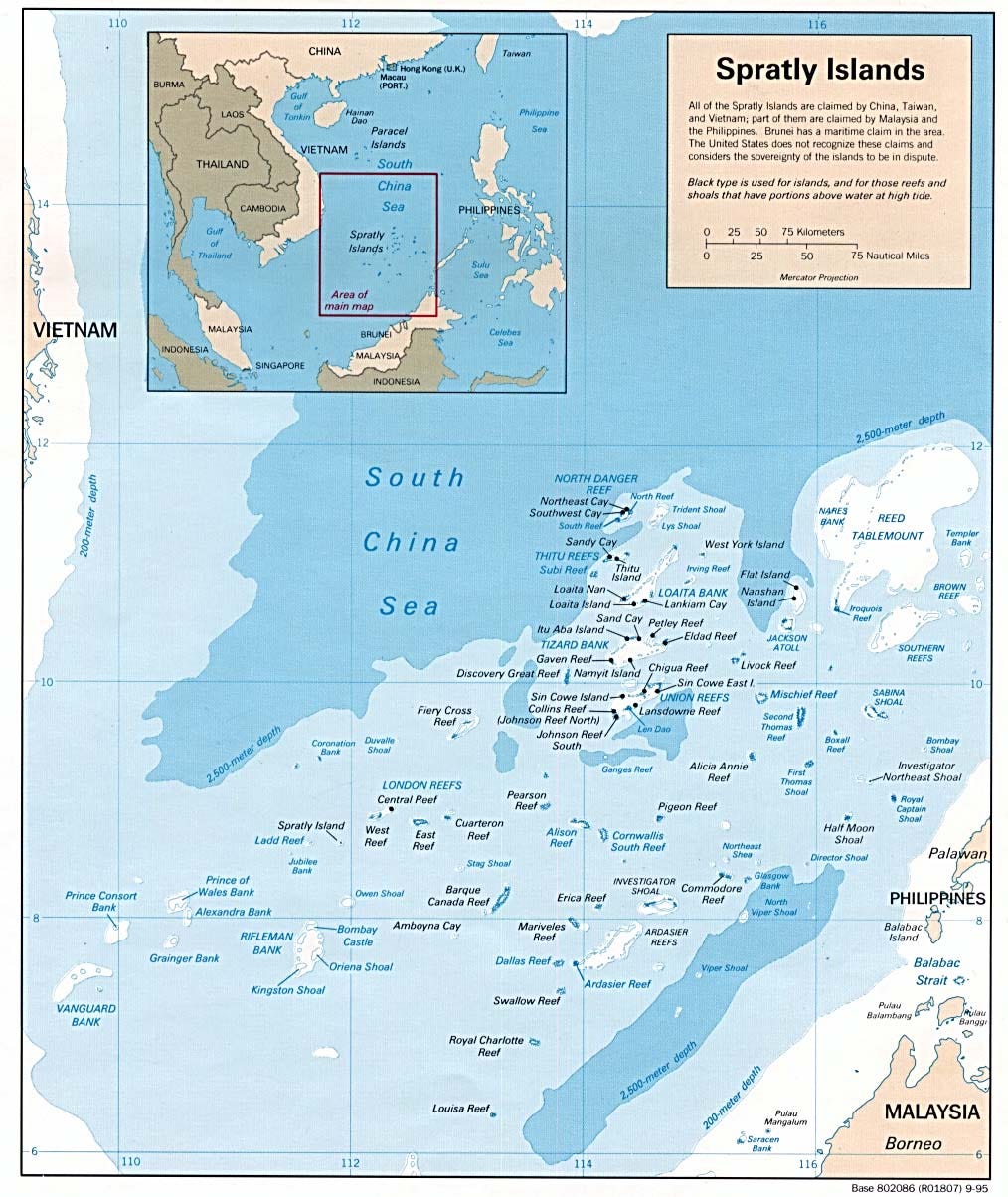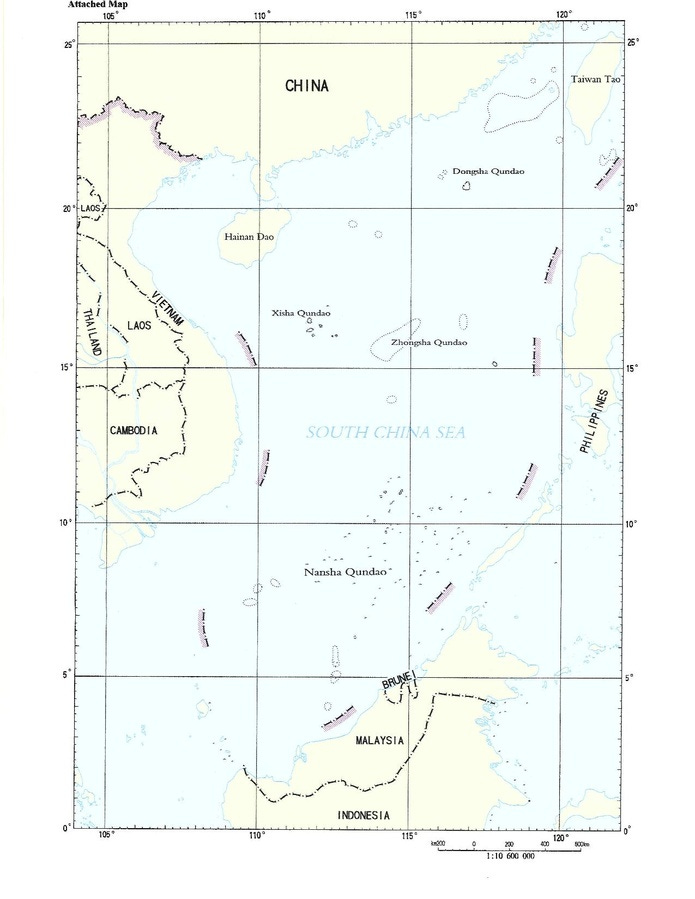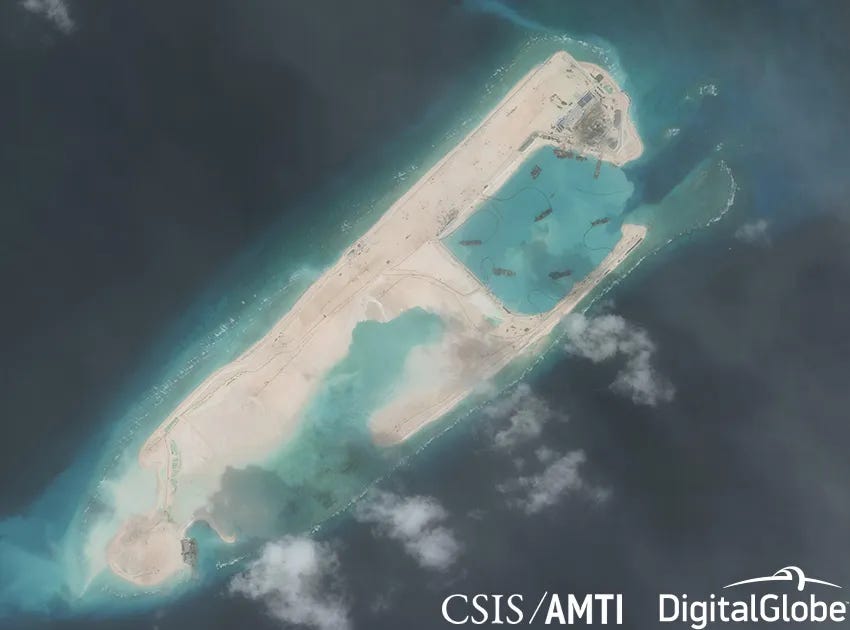The sound you are hearing is a US Navy plane purposefully violating airspace claimed by the Chinese government while conducting a freedom of navigation patrol over a set of artificial islands in the South China Sea. The radio operator’s odd meowing response sets a comical tone for an intensely serious power struggle for control of the security and economy of East Asia.
This story will take us to a smattering of coral atolls and sandy rocks between China, Vietnam, and Malaysia that holds the key to China’s economic security. China has been dredging these islands up over the last 20 years or so. Part of a drive to nominally increase security in the region, by placing military assets eg. airbases and military ports in the operational area, experts widely agree that the goal is to create an Exclusive Economic Zone (EEZ) in the area. Roughly ⅓ of world trade runs through this shipping lane and China seeks to tax it.
History
Post WW2, China got a seat at the table after siding with the Allies against Japan, they were granted fairly wide rights in terms of reparations and territory for Japan’s unchecked aggression during the war. Although not directly given the islands. They cite a territorial claim from the 1800s using the “9 Dash Line Map” which almost everyone else claims gives China far too much maritime control.
This swathe of territory essentially stretches to the coasts of Vietnam, Malaysia, and the Philippines. Unsurprisingly, the other nations neighboring this claim reject it entirely, saying it’s far too much latitude. The southern most line aka Dash 4; falls within 24 nautical miles of Malaysia, near the James Shoal, the CCP calls this the Most Southern Point of China. Others disagree…
The “Islands”
Most of these islands are not much more than pieces of rock sticking up out of the sea, many are covered during high tide. So China has spent millions of yuan on dredging projects. Massive barges dig up the sea floor and piling it onto shoals and rocks in order to create the ‘artificial islands’ we heard so much about. The reason? As a platform for weaponry and logistics, so that China can extend its military might over this region. Satellite images show massive growth enough to support airfields and deep water ports where cargo and military ships can dock. SEE HERE
Why Does This Matter?
Control of these islands allows China to claim these waters and air as sovereign territory. Although a nation’s legal jurisdiction only goes out 12 nautical miles from shore as we all learned in that one episode of The Simpsons.
There is another boundary that extends much further. An Exclusive Economic Zone (EEZ) extends for 200 nautical miles and marks the true edges of a country’s power. This is where they can make resource claims and economic trade zone claims. Each island would allow China to claim a 200-mile circle around the island and enforce the 9 Dash Line Map. As mentioned above, roughly ⅓ of the world's shipping goes through this region, if China was able to extend its EEZ, it could tax these routes to a massive degree. Additionally, the US Energy Information Agency estimates that the South China Sea holds about 190 trillion cubic feet of natural gas and 11 billion barrels of oil in proven and probable reserves. This is a massive plus for China, a nation without any major oil reserves, who as we mentioned in a previous episode, is the world’s largest importer of crude oil, and its use as of 2022 is expected was 14.3 million barrels per day. CONTEXT: In 2022 China imported an average of 10.2 million barrels of crude oil per day. In 2023 11.4 million b/d.
Much of the oil reserves are actually along the periphery of the South China Sea. Closer to the Philippines, this EEZ would give China far greater influence on those oil fields and the revenues earned from them.
Xi Dreams of Prosperity
The revenues from this have the potential to buoy China’s economy, the CCP’s connection to all industries allows them to infuse cash directly into companies with little issue. It would allow their economy to slow its spiralling descent and perhaps even find a floor. But these islands require massive infusions of cash and influence to build and maintain. Is it worth it?
Additionally, if China could begin to wean itself off of foreign oil and coal, it would be in a much stronger position for the next 50-100 years. Not having to pay direct competitors for energy and not having to rely so heavily on massive and expensive geoengineering projects like the 3 Gorges Dam for power, which often end up over budget and behind schedule.
The Achilles Sea
International law states that China needs to be able to maintain security of the seas and air in order to claim it as sovereign territory. The clip we heard at the beginning of the episode is a US plane intentionally violating the airspace so that China doesn’t have a legal claim. America and the allied nations in AUKUS (Australia, United Kingdom, United States) routinely flaunt this in order to prevent China from claiming the sovereign territory and securing an economic foothold. Additionally, it brings many of the competing nations bordering the South China Sea closer to us as we weaken China and embarrass them.






